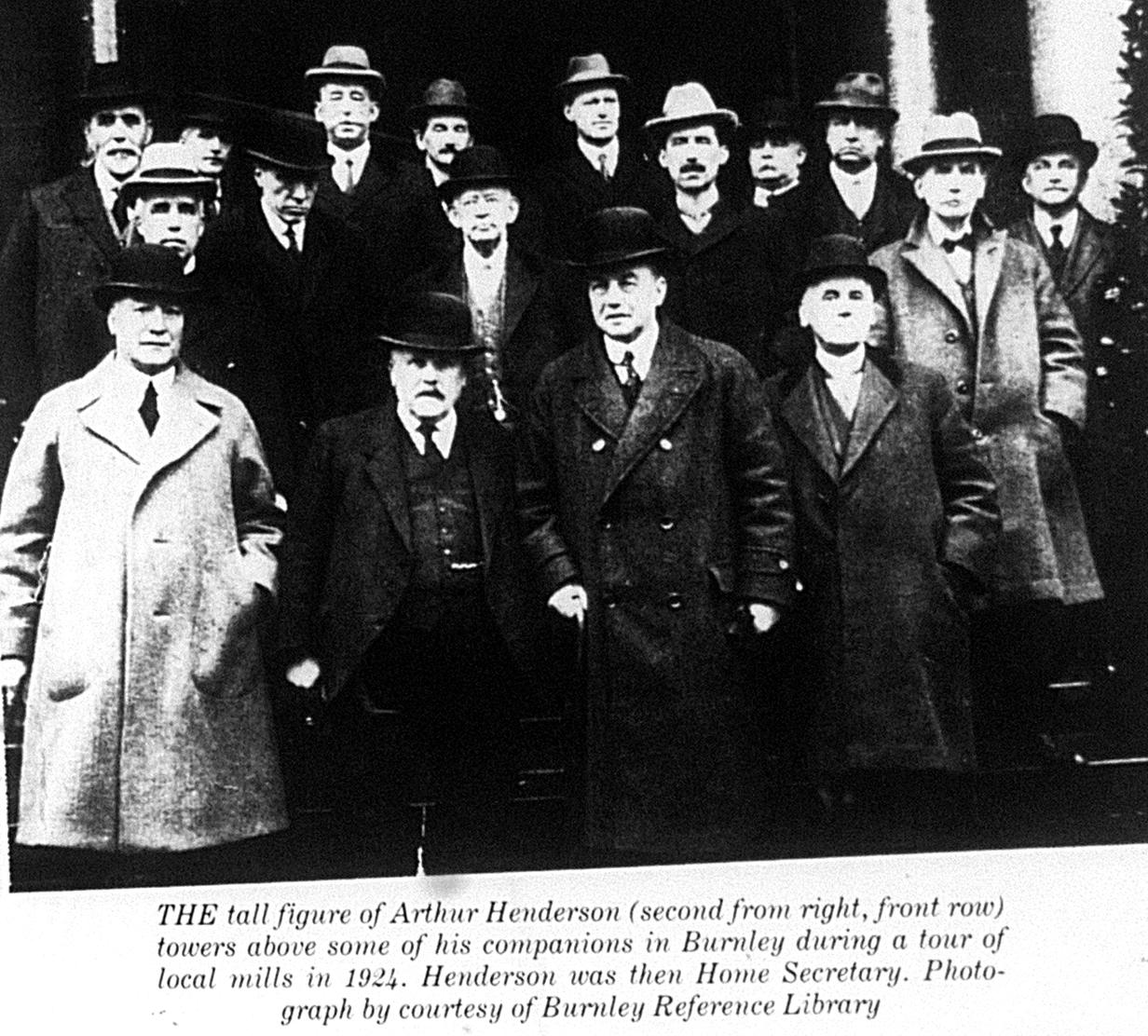Arthur Henderson, MP for Burnley from 1924 until 1931

Arthur Henderson, Labour MP for Burnley from 1924 until 1931.
One of the best known of the early Labour leaders, and known to many as "Uncle Arthur", he was Home Secretary in the short-lived Labour Government in 1924,
and Foreign Secretary in the minority Labour Government of 1929-31.
When Henderson fought Burnley at a by- election, he already had 21 years' parliamentary experience behind him as MP for Barnard Castle (1903-18), Widnes (1919-22) and East Newcastle in 1923.
Henderson replaced Dan Irving, Burnley's first Labour MP, who had won the seat in the December General Election of 1918. Henderson after 1918 never really held a safe seat almost to his death.
He had been able to win Barnard Castle in 1903 because he was a known ex-Liberal. He had been agent for Sir J. W. Pease, Liberal MP for Barnard Castle, from 1895 until 1903.
Before 1914, local arrangements encouraged by Herbert Gladstone, Liberal Chief Whip, and James Ramsey MacDonald, first secretary of the Labour Party, meant that in certain seats the Liberal Party put forward no candidates, giving Labour a free run. The aim was to prevent Unionists and Conservatives getting in on minority votes.
After 1918 election local arrangements no longer applied.
Henderson was the architect of a new constitution for the Labour Party in 1918 which provided for individual membership and which aimed for full power.
Before entering parliament, Henderson had had experience as a member of Newcastle upon Tyne and Darlington Councils and Durham Council. He was the
Chairman of the Labour Party on several occasions.
A native of Glasgow, Henderson grew up in Newcastle upon Tyne, went to a church school there and was apprenticed to Robert Stephenson and Co., the engineers. He was prominent in the North-East for his work for the Iron-founders' Union and as secretary of the North-East Conciliation Board. He was an effective lay preacher.
In the 1914-18 war he was a member of the all-party Coalition Government.
In 1932 Henderson became president of the World Disarmament Conference.
Father of a barrister son who represented Cardiff South for a time, he was shattered when Ramsey MacDonald, during the economic crisis of 1931, accepted the Premiership of the all-party National Government.
Unlucky after 1918 in not finding a "safe" seat as a national Labour leader, he had to spend much time electioneering for others in various parts of the country, and was forced to neglect his own seat at election times.
It was not until he was returned for Clay Cross in 1933, again at a by-election, that he could be said to have a safe seat again.He was a sick man then and died in 1935.
Many have argued that the history of the Labour Party would have been very different had Henderson led the party after the 1914-18 war.
A man of great integrity and personal loyalty. he was unquestionably one of the most liked of the early Labour leaders, and certainly one of the makers of the modern Labour Party.
He was very much a follower of the Bible, rather than of Karl Marx.
Later Career
From Wikipedia.org
When Henderson returned to Parliament after winning a by-election at Clay Cross, achieving the unique feat of being elected a total of five times at by-elections in constituencies where he had not previously been the MP. He holds the record for the greatest number of comebacks from losing a previous seat.
Henderson spent the rest of his life trying to halt the gathering storm of World War II. He worked with the World League of Peace and chaired the Geneva Disarmament Conference, and in 1934 he was awarded the Nobel Peace Prize. (On 3 April 2013 his Nobel medal was stolen from the official residence of the Lord Mayor of Newcastle.)
Henderson died in 1935, aged 72, and was cremated at Golders Green Crematorium. All three of Henderson's sons saw military service during the Great War, the eldest, David, being killed in action in 1916 whilst serving as a Captain with the Middlesex Regiment (Duke of Cambridge's Own). His surviving sons also became Labour politicians: second son William was granted the title of Baron Henderson in 1945, while his third son, Arthur, was created Baron Rowley in 1966.




